In the span of a few years, Mexican director Manolo Caro has forged his own brand of witty romantic comedies, which often times feature a female-centric plot. His filmography of nearly half a dozen features includes the satirically titled comedies Elvira, I Will Give You My Life But I’m Using It and I Don’t Know Whether to Slit My Wrists of Leave Them Long.
One of his preferred muses, Cecilia Suárez, has appeared in his two most recent productions and has followed him into his upcoming, and still untitled, Netflix episodic project. Their collaboration in Tales of an Immoral Couple (La vida inmoral de la pareja ideal), came quickly after Elvira and allowed them to further develop their creative relationship. Suárez is the lead again here as Martina, a woman who is confronted with a man she once loved but never thought she’d see again.
Caro has also repeatedly sought out Mariana Treviño’s talents, who you might know as Isabel in Club de Cuervos, for juicy supporting roles. In Tales, the actress portrays a widow who is still begging for her sister’s atonement for a betrayal in their past. Treviño certainly knows how to make her screen time memorable. On the opposite end, Ximena Romo, whose performance as young Martina is bubbly and fearless, is a newcomer to the Manolo Caro universe. She might appear to be a fresh-faced talent, but her career in independent cinema, mainstream television, and theater goes back over a decade.
Remezcla had candid conversations with all three women about the concept of morality, working in film vs. television, and nostalgia for one’s youth.
Tales of an Immoral Couple opens in US theaters on August 25, 2017.
On Why They Joined Tales of an Immoral Couple
Ximena Romo: I was very interested in working with Manolo Caro, who has been making movies that have a unique touch. I feel he is a director that tackles themes from a singular point of view in a very Manolo Caro-way. Also, working alongside Cecilia Suarez, who is an actress I deeply admire, was an opportunity I couldn’t miss. As soon as I knew, I was very happy to be able to part of this project.
Cecilia Suárez: I wanted to tell a love story because I hadn’t had the chance to do a lot of romantic comedies and I wanted to make one. It’s a story that appeals to nostalgia, and it appeals to nostalgia and the sweetness of a different time while contemplating the sweetness of the current moment, of what we are living today. I really liked that about the story, besides the fact that it’s a very fun story. It’s a story that even though it’s about love, it also touches on other themes like friendship, solidarity, and also about the misery that often times exists in human beings, particularly with the character of Amelia.
Mariana Treviño: Manolo invited me directly to join the project. I’ve been fortunate to be considered for roles in his recent films, He had talked to me about this movie, but then he did other things. I had it in my mind, and suddenly he called me one day and said, “Now we are really making it.” He had just done Elvira, I remember he did them back to back. He had very little time to make both of them. He made Elvira first and then we made this one. I was interested in working with Manolo again because the characters he offers me, even if they are small, have a love of meat in terms of acting. They are characters that are in a precise moment and that serve a specific function within these entangled stories. In the case of Beatriz, I was attracted to this character because I find relationships between sisters very interesting. Family dynamics are always great topics to analyze, to recreate, and to put in movies. In the relationship between these two sisters there are conflicts that haven’t been resolved and that have been brewing for a long time. When they are brought up again we see how things unfold. Also working with Cecilia, whom I’ve worked with before and love a lot, was an incentive.
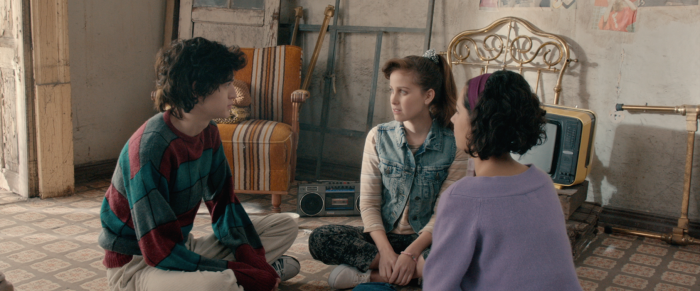
Cecilia Suarez On Her Relationship With Manolo Caro From Elvira to Now
This time we already had a connection and a language that is easy for both of us. We have a very natural understanding when we are boarding a project. There is a clear understanding of what he is looking for and what we can do together. That’s very interesting. With each director there are things that move you in a particular way, each of them has their own way of doing things. I can tell you about Ernesto Contreras with whom I’ve done two films. There is a very profound communication between us. Each director has his or her own way. As we go from one project to another, this becomes even clearer because you begin to understand the director’s style. You understand what he wants to tell and why it is important for him to tell it. It results in a very joyful exercise to work based on that mutual understanding. Manolo likes to have fun when he shoots and that becomes more important for me each time. The shooting of the film is what remains with us as a team, because the film then finds a life of its own and we are no longer there even if it seems like we are. What we really live is our shooting time, and it’s very important that this time is one of joy doing what we do.
On How People Change Over Time
Ximena Romo: The film is a bit nostalgic about that moment in our lives where we are fearless and curious. We see the world in front of us and we want more. The film represents this moment in a way that makes you want to go back, also because of the music in the story. It’s about yearning for the past, but also to think that it’s in love that one finds the path to go back to that moment. Love is the thing that can’t be lost, what will always be there, and maybe what is going to save us. Love is what can take us back to that moment in our lives.
Cecilia Suárez: That happens without a doubt. People change because of the impermanence of things and ideas, but I think the film appeals to the notion that there are also things that remain, even inside that whirlwind where everything is diluted and is transformed. There are also things that stand the test of time. Those are the ones that matter after all.
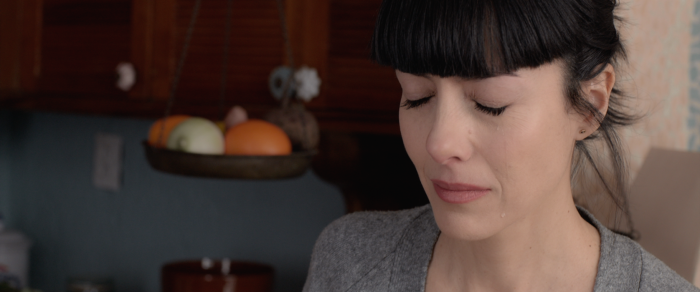
Cecilia Suarez on Manolo Caro’s Writing
His writing style is very particular and he has a singular sense of humor. This film was also made among friends. The cast is such a gozada and you can see that on screen. For example, in the dinner scene, which took days to shoot, is similar to what happened when we were not shooting. It’s a very fun and enthusiastic group of people. It was so much fun. The dinner scene is very long and was shot over several days. That type of scene during the shooting tends to be very tiring and being people who are in a good mood and with people that want to have a good time while working makes it very special. I think that shows. I think that’s also why people enjoy it so much, because we had a great time making it.
On the Concept of Immorality
Ximena Romo: In the film the idea of immorality, which is, of course, is in the title, is about making it ironic, because in reality immorality means the things that society considers wrong. It’s not something that is true, but forces us to put limits to our desires. Sometimes, because we punish and close ourselves to those desires, it diminishes us and destroys our spirit, which comes from that pure love that’s and essential part of our lives and ourselves. Those ideas end up destroying us. They extinguish the flame of innocence and purity that we all have; however, the best part about the film is that it says those barriers don’t exist and that love can save us.
Mariana Treviño: Immorality, as we see it in the movie, has to do with society. It has to do with education, which is comprised of many beliefs that are passed down from one generation to the next. Sometimes parents don’t have the tools to provide a different type of education, like Beatriz’s mother. She was educated by telenovelas. She was disconnected from her life, from her daughters, and from her own happiness. There are also other characters, like the dance teacher and the photographer, which make it even trickier. On one hand there is this external judgments and preconception from society about what life, love, and experimentation should be. When we are teenagers, which is a very vulnerable stage where lots of things are happening to you, you don’t know what is happening to you and you can’t articulate those experiences. There is this innocence of discovering love and relationships. Those very pure processes that are part of our humanity are often times truncated by prejudices that have to do with the collective ideas of society and what type of parents you have. Then there are these two of other characters, the dance teacher and the photographer, who in their roles as adults are preaching a type of freedom, but they do it with a group of kids that are not adults yet. Kids of that age can’t experiment with an adult. They think they can, but they can’t. There is a lot of confusion at that age. In the film their search for love is coated by a lot of things that create noise. They don’t know how to handle the desires of these adults, they see it as a game, but they don’t realize the implications, because the adult world is the one that judges you. These two adults interfere in the loving experience these teenagers were having.
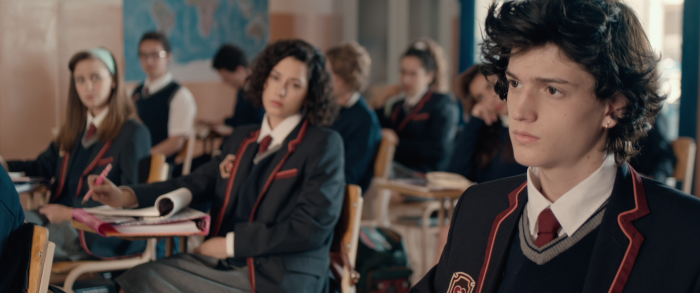
Cecilia Suarez on Manolo Caro’s Upcoming Netflix Show
We are finishing our third week of shooting and you’ll see it soon. We are having a good time, but I can’t tell you much about it. Hopefully we can talk about it in the near future. What I can say is that Veronica Castro is a fantastic actress and an extraordinary colleague.
On Television vs. Film
Ximena Romo: Cinema is my home, that’s where I started and it has always been very welcoming to me. Television has also offered me great opportunities, but it’s much more complicated because of time. There is not enough time to dive deep. You are always rushed because you have to fill a lot of hours of content. Sometimes in television you resort to some of the same things and have to go around the same thing. Cinema gives you a space to tell what you have to tell in the moment that you have to tell it with the time that you want to tell it, and not have so much filler. But now television is going through a revolution and with series and new formats they are finding the way to be more concise. They do tell longer stories, but without spending so much. That’s what’s interesting right now, and I’d love to join that game.
Mariana Treviño: I’ve really enjoyed the episodic format in Club de Cuervos because it allows a longer exploration of the character. Each season characters show different facets and we explore more deeply what’s happening to them. The series are sagas, and the characters’’ life stories continue and that becomes very interesting because the characters keep going on their own as they seek their resolution by themselves. Cinema is also a wonderful format because you have a limited time to tell a fragment of a human story. I’m a big fan of short stories, I think they are the best, so even though cinema is not as a short as a short story, you do have a limited time to develop an arc of experiences. Now that Manolo Caro is embarking on his own Netflix show, I hope he enjoys this longer format that I’m sure will last for many seasons because he has a very interesting cast. I hope he trusts this format that will take him to new creative places. That’s the beauty of it, that these different format allow you to explore different ways of doing your job, and to enrich your experience as an artist.
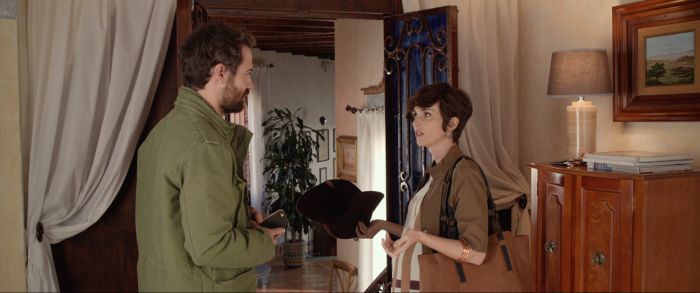
Ximena Romo on Developing Her Character with Cecilia Suárez
Manolo had the two couples, the younger and older versions, working together a lot. He had us talking about the characters and the scenes, and he also gave us exercises so we could see and study each other. It was also to break the ice, and for us to feel confident to say if we wanted to take the character on a certain direction or if we had any reservations. Cecilia is a wonderful actress and was very generous with me in order to help me. Undoubtedly, she has much more experience than me. I was there to learn from her and it was wonderful because we got to talk about the character and about the change that happens to our character in the story. I feel my job was to portray a free, innocent, and adolescent Martina who wants to devour the world and who is punished my society because of this freedom. In the end, as a middle-aged woman, we see her in a lonelier place where she was able to express such freedom and spirit, and where she could feel comfortable. However, what she lost in that process was love. That’s what the story is about. Cecilia and I talked a lot about how Martina had to be very self-assured. Even though society punished her, and even if she had to confront her mother, her family, and her school, she ultimately does what she wants to do. Even if she had to go to San Miguel to an isolated place, she would still find the way to do what she likes and what moves her. She is a different type of character because she doesn’t give up and is very brave.
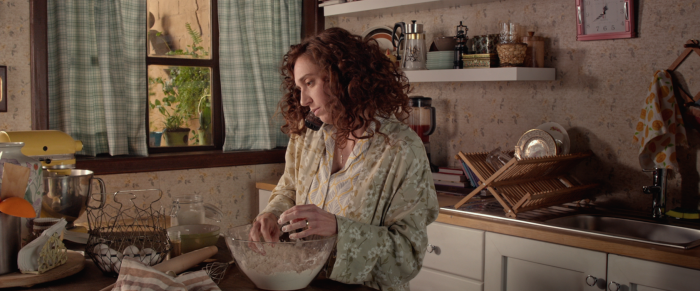
Mariana Treviño on Why Her Character is Like a Real-Life Villain
Sometimes because of our prejudices, which are not even ours but have been implanted and are part of our upbringing, you can become that. If you don’t control them and realize which are your real feelings and not the ones that been forced on you, you don’t confront your fears and you don’t confront what’s happening to you. That’s what happens to Beatriz. When you are easier to manipulate, which is when we are growing up, and when your sister’s friends are like the most important authorities, you let yourself be influenced by what you consider to be an adult. I remember when I was a little girl, I would play with my friends and I’d say, “Let’s pretend we are grownups. You are 15 and I’m 16.” For us those were adults. We were like 11 and we saw girls that were 16 like if they were already older ladies. I imagine this character sees her sister’s friends like the ideal adults. She let’s herself be manipulated and there is also a lack of communication between the mother and her daughter, which is also a theme in the film. Sometimes parents don’t realize what their children are going through and the experiences they are having because they establish a lack of communication during that very vulnerable stage that is adolescence. Beatriz is a victim of external manipulation from her mother and sister and she doesn’t say things she should have said. Sometimes that happens to us in life, we don’t say something and keep it in, then we discover that these things always catch up to you and you end up having to say them sooner or later. You have to decide when do you want to confront that unresolved thing in your past. That’s what happens to Beatriz.







